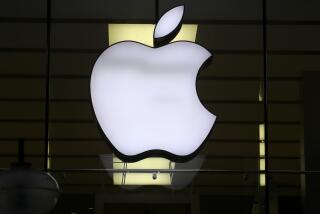Apple’s new Mac Pro can cost $52,000. That’s without the $400 wheels

- Share via
Apple Inc. started selling its new Mac Pro desktop computer on Tuesday, complete with eye-watering pricing options that can push the cost north of $50,000.
The new machine, built in Austin, Texas, after Apple got tariff relief from the Trump administration, starts at $5,999 for specifications that some programmers, video editors and photographers might consider measly. Fully loaded, the computer costs more than $52,000, and that’s excluding the optional $400 wheels for easily moving the machine around an office.
For some professional users, the cost of Apple’s new computer is just part of doing business. But for most consumers, the Mac Pro’s price is shocking, making it one of the most expensive personal computers in the world. Some Apple users compared the cost to a car.
The base product includes 256 gigabytes of storage, low for professional computers in the same price range. A 4-terabyte option is an extra $1,400. An 8-terabyte upgrade is coming later, according to Apple’s website, but pricing hasn’t been announced.
To increase the computer’s RAM memory from 32 gigabytes to 1.5 terabytes is $25,000 extra, the main reason the price can exceed $52,000. Apple said a version of the Mac Pro designed to be racked in data centers costs an extra $500 and will launch later. The Mac Pro does not include a display. Apple put a new Pro Display XDR on sale Tuesday for $4,999.
The Mac Pro’s pricing first came into focus in June when the company announced the product and said that a stand to hold the new monitor would cost an extra $999.
The company also said Tuesday it was doubling the cash-back offer for the Apple Card on Apple hardware purchases to 6% until the end of the year. That could make such purchases just a little easier.
More to Read
Inside the business of entertainment
The Wide Shot brings you news, analysis and insights on everything from streaming wars to production — and what it all means for the future.
You may occasionally receive promotional content from the Los Angeles Times.


![Monrovia, CA - November 06: Original Apple-1 "NTI" motherboard and an Apple Cassette Adapter (ACI) in an original ByteShop Apple-1 koa wood case with Datanetics Keyboard Rev D [keyboard dated: Sept 21 1976]. Morgana Blackwelder with Hand-built Apple-1 displayed for auction at John Moran Auctioneers on Saturday, Nov. 6, 2021 in Monrovia, CA. (Irfan Khan / Los Angeles Times)](https://ca-times.brightspotcdn.com/dims4/default/ab3eeec/2147483647/strip/true/crop/2393x1600+4+0/resize/320x214!/quality/75/?url=https%3A%2F%2Fcalifornia-times-brightspot.s3.amazonaws.com%2Fee%2F8c%2Fa8b37d02425890021cfcd2b29c00%2Fla-photos-1staff-868241-me-1106-apple-first-unit-005.IK.JPG)







